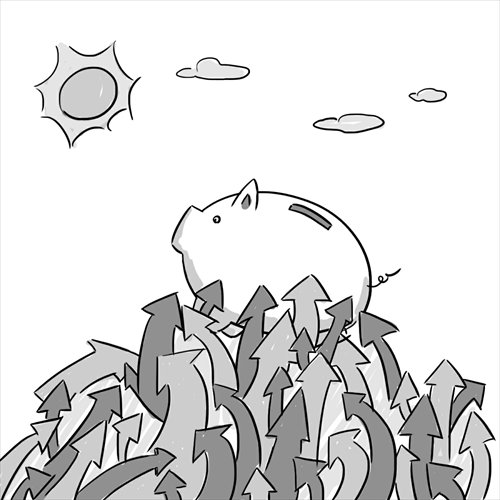HOME >> BUSINESS
Banking system able to absorb market shocks
Source:Global Times Published: 2013-12-12 21:18:01

Illustration: Chen Xia/GT
At a conference held Tuesday in Shanghai, representatives from Moody's Investors Service discussed China's credit outlook as well as the forces expected to drive the country's future economic development. While the ratings agency foresees stability overall in the country's banking system over the next 12 to 18 months, the period isn't expected to be entirely problem-free.For traditional players in China's financial services industry, most of the bumps ahead are likely to come in the shape of expanding market reforms. According to documents published in official media outlets following the recent Third Plenary Session of the 18th Communist Party of China Central Committee, the central government has made it clear that it wants to see the market gain more sway over the allocation of resources, including capital and bank credit.
In a more marketized macro environment, economic growth is projected to ease into the mid-7 percent range through 2014 as capital formation decelerates, according to statements made in Shanghai by Tom Byrne, senior vice president at Moody's Sovereign Risk Group.
As reform measures seep through into the financial system, the government is expected to help steer local banks through the coming transitions. Big retail banks are slated to receive the most help and guidance, given the staring roles these institutions play in the economy and society at large.
By contrast, financial authorities will gradually unwind supports for smaller industry players as the rollout of comprehensive bankruptcy laws takes the government off the hook for bailing out distressed financial institutions.
While China's Big Four lenders - that is Industrial and Commercial Bank of China, China Construction Bank, Agricultural Bank of China and Bank of China - are already well-placed to absorb the reforms outlined by the top leadership, their smaller peers can bank on tougher times in several quarters. Over the near-term, conditions in China's banking sector will probably boil down to how well these less-insulated institutions can cope with a growing set of market challenges.
Traditional banking outfits across China are now contending with a growing number of nonbank wealth management products and investment channels. This has put pressure on lending rates and driven up funding costs across the industry.
Chinese banks can look forward to narrowing interest spreads, thinning profits and stiffer competition for deposits as financial authorities liberalize rates within the commercial banking market. Of course, this trend will be felt hardest among small- and mid-size banks that already rely on competitive yields to fight larger names.
Issues related to asset quality may intensify as well if the market loses patience with the current risk-management status quo. According to Wind, a financial data provider, nonperforming loans were up 18 percent year-on-year as of the end of September. The 9.7 trillion yuan ($1.59 trillion) in outstanding loans held by local governments as of June-end has some worried that a wave of defaults could be around the corner. Similarly, the rapid development of shadow banking has brought its own set of problems to China's financial system. With more money funneling into minimally supervised off-balance-sheet vehicles, systemic risks could become more acute as market forces gain traction.
Fortunately for China, the hazards mentioned above are well-known to the country's planners and work is currently underway to mitigate their influence. For example, the central government has already called for an overhaul of the local government financing system to introduce more transparency into public finance.
With the government also firmly committed to a large-scale rebalancing of the domestic economy, observers see enough political will on tap to manage any potential crises. The gradual pace of reforms also means that the banking sector should have enough time to prepare for big changes.
The article is compiled by Global Times reporter Yu Xi, based on speeches made at the Moody's conference held in Shanghai. bizopinion@globaltimes.com.cn
Posted in: Comments